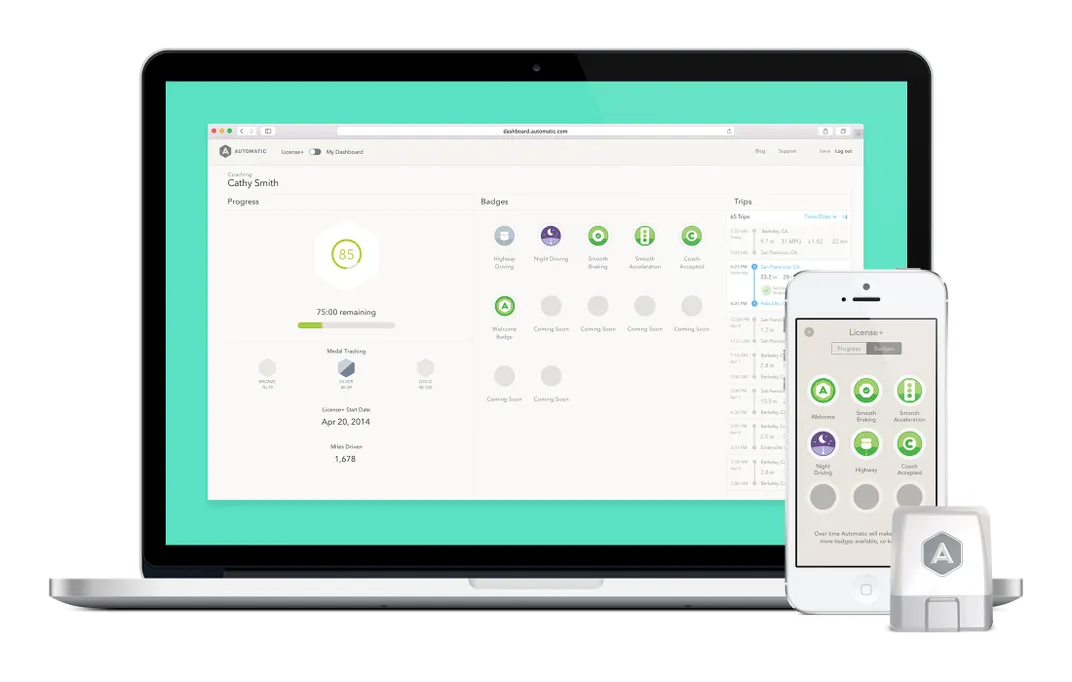Parents, Give Your Teens Driving Lessons Without Even Being in the Car
A six-month training program gives parents of new drivers a training tool—and a little extra peace of mind
/https://tf-cmsv2-smithsonianmag-media.s3.amazonaws.com/filer/31/97/31971ea4-80a0-4bf4-b11a-a794b0550216/automatic_licenseplus_teen72b959997723.jpg)
During their first six months on the road, new drivers are at the highest risk of being involved in a fatal crash than at any other point in their lives, according to data collected by the National Highway Traffic Safety Association. Further research has revealed that the vast majority of teen accidents are due to basic driving errors, such as speeding or not properly scanning the road for blind spots.
Many of these errors might be prevented if parents could find a way to train their teens in the critical period just after they become street legal and before they are ready to drive entirely on their own.
Last month, Automatic, a California company specializing in smartphone-based car diagnostics, revealed License+, a free upgrade to the Automatic app. License+ allows parents and teens to enroll in a 100-hour driving training program designed to teach newbies best practices when they’re on the road.
The system works with Automatic’s two-inch Link dongle. The $100 device connects to a car’s onboard diagnostics (OBD) port, which is standard on any car from 1996 onward. Through the port, the dongle is able to track the car’s location, speed, engine status, braking, mileage and fuel consumption. Drivers can set the dongle to emit audible tones for bad habits, such as speeding or hard braking, to help them be better drivers and save fuel. Data syncs with Automatic’s smartphone app and Web interface, providing drivers a snapshot of their trips.
License+ adapts that existing Automatic functionality into a coaching system. “We want to get from licensed driving to good driving,” says Automatic senior director and License+ lead Steve Bishop. “We can help close that gap.”
When a new driver enrolls in License+, he or she selects a coach, an adult who will have access to a select amount of driving data. The program monitors the teen’s driving for 100 hours, which equates to about six months’ worth of cruising. Based on his or her performance, the teen receives a driving score that’s based primarily on accelerating and braking patterns. Speeding, for instance, will result in a lower score. Over the course of training, drivers can earn badges for good behavior—say, 50 miles with no hard braking or a certain amount of safe highway driving. Similar to the original Automatic experience, tones alert teens of bad braking or acceleration in real time, so there’s no reason for a teen to look at his or her phone while on the move.

Coaches' access to driving data is intentionally limited. They can’t see a car’s current location or monitor a trip in real time. In fact, there’s no map view whatsoever. Instead, the coach’s view contains data on recent trip lengths, miles driven, badges earned and the driving score. “Ideally, [coaches] will have a conversation with the driver to talk through the week’s events,” explains Bishop.
Bishop stressed that Big-Brother monitoring is neither the point of License+ nor is it something that parents—and clearly, teens—want. “We went into this understanding that parents worry, and we wanted to help them worry less,” recalls Bishop. “[Through interviews and our alpha testers], we learned that the way to make them worry less is not giving them more data.” Rather, parents want to train their kids to be able to make smart decisions on their own, and learn skills necessary to become a trustworthy adult. “Spying short circuits that effort,” he says.
Because the system is only a few weeks old, it’s nearly impossible to quantify how much it will improve a teen’s driving habits. But if adult reactions to Automatic and other self-monitoring gadgets, such as Fitbits, are any indication, the effects of such tactics are real. For example, a University of California, Riverside study found that drivers who got real-time fuel-consumption feedback improved fuel economy by as much as 6 percent.
Eventually, Automatic may expand its driver-training features to include a program for teens at even earlier stages, including ones who just hold their learner’s permit. But for the time being, the team will continue to refine License+ based on feedback from parents and teens alike.
/https://tf-cmsv2-smithsonianmag-media.s3.amazonaws.com/accounts/headshot/me.jpg)
/https://tf-cmsv2-smithsonianmag-media.s3.amazonaws.com/accounts/headshot/me.jpg)